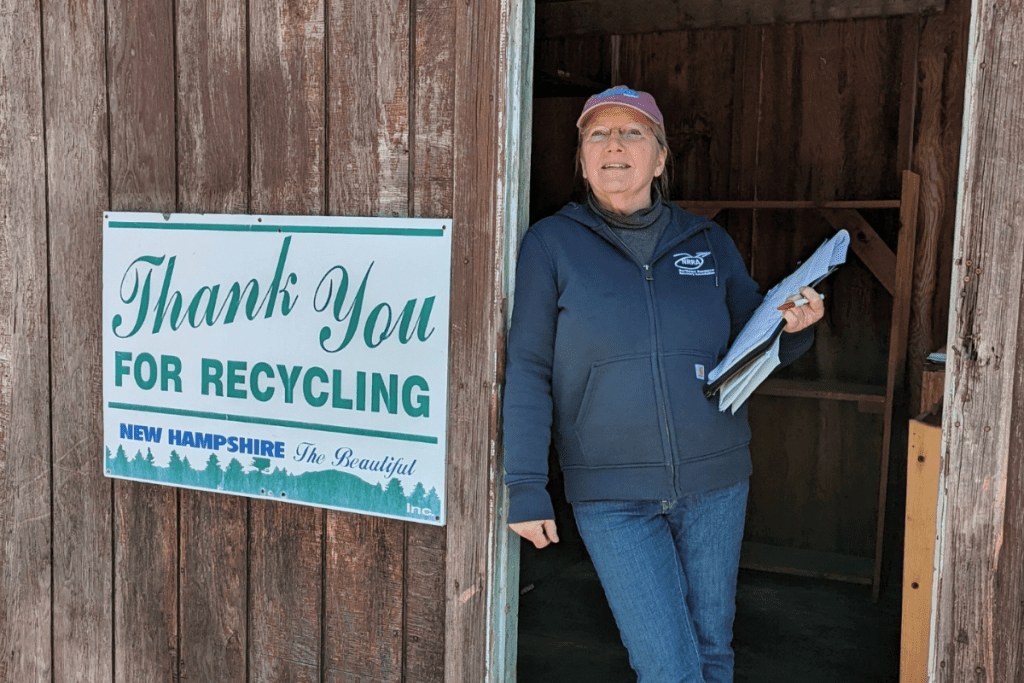
Bonnie Bethune of the Northeast Resource Recovery Association . | Photo courtesy of the Northeast Resource Recovery Association.
A warm welcome back to “Women in Circularity,” where we shine a light on women moving us toward a circular economy. This month, I was pleased to connect with a long-time recycling advocate: Bonnie Bethune. Bonnie is the Sr. Member Services Representative for the Northeast Resource Recovery Association (NRRA), the oldest and largest cooperative-model recycling nonprofit in the United States. She has over 40 years of experience in the recycling industry with a focus on municipal recycling.
Reflecting on your career, you have driven many changes within the recycling industry. How did your career evolve along with the industry’s advancements?
In the late 1970s at the University of New Hampshire, my work study job was at the Durham Recycling Center where I discovered my passion for recycling. The manager took me aside one day and said that I should help municipalities with recycling as that is where the greatest need was. I took that advice completely to heart. After college, I managed the Wilton New Hampshire Solid Waste District facility which housed a municipal incinerator and two balers. It was a steep learning curve from solid waste management theory to hands-on experience. From there, I moved to New Boston, another small New Hampshire municipality, to raise my three daughters. I was recruited to manage the landfill, assist in the landfill closure and design of the recycling facility that is still performing very well 40 years later. When NRRA approached me to work on member services in 2003, I was ready to broaden my reach and assist others in their efforts to recycle more and waste less. As the industry evolved, solid waste management rules and regulations and recycling standards became more stringent and demanded a more advanced depth of knowledge and continuing education for myself and for recycling facility operators.
The delivery of technical assistance is key to NRRA’s work. How does knowledge transfer help your members and advance the industry?
Technical assistance is my strong suit and having a deep experience in the field has helped immensely in relating to our members, particularly operators who run municipal recycling facilities. The response I give to NRRA members who often “apologize” for asking so many questions is that, “The questions you ask help me to help other members with the same questions.” Over time, inquiries have evolved from, “Where can I recycle my glass,” to, “How do I safely manage lithium batteries?” Or “Are solar panels recyclable?” Or “How do I help the public understand the importance of proper separation of recyclables?” As a result, I have a wealth of resources I freely share with others.
Is there a recent project that stands out as a personal favorite? What made it meaningful for you and what impact did it have?
With half my career managing recycling facilities and the other half assisting operators to manage theirs, I believe that this profession becomes more noble and more worthy of our collective acknowledgement and support. My means of acknowledging and supporting our members is to visit their sites, do a walk-around and witness the pride they have in their operation. I leave the visit with an image of their day-to-day accomplishments and challenges. I can offer suggestions on potential improvements and feel good about those personal and professional connections.
The recycling industry has experienced significant shifts over recent years. What recent trend has had the most impact and why?
When I first started at NRRA, we communicated with our members via phone, email or in-person. In more recent years, the shift to multiple means of information sharing has had a significant impact. At NRRA, the past few years have been jam-packed with conferences, bus tours to member and vendor facilities, toolkits on managing common items at recycling facilities, conversations via phone and text, in-person and virtually-attended meetings and social media posts. A common request for information starts with “I saw this on your website, can you give me more information?” An invaluable connection is made and the discussion evolves from there.
Is there a book that continues to inform your environmental stewardship?
I recently re-read Henry Beston’s “The Outermost House” about his year on a Cape Cod beach in 1928. It reminded me of my love of nature and why I have embraced and enjoyed a career in helping to protect our natural resources and hopefully have inspired others to do so.
MaryEllen Etienne is the creator of “Women in Circularity.” Etienne works on the Market Transformation and Development team for the U.S. Green Building Council. She has over 20 years of experience in sustainability and is a champion of the circular economy.

